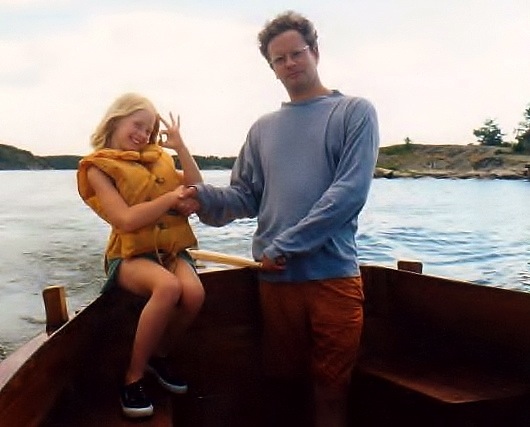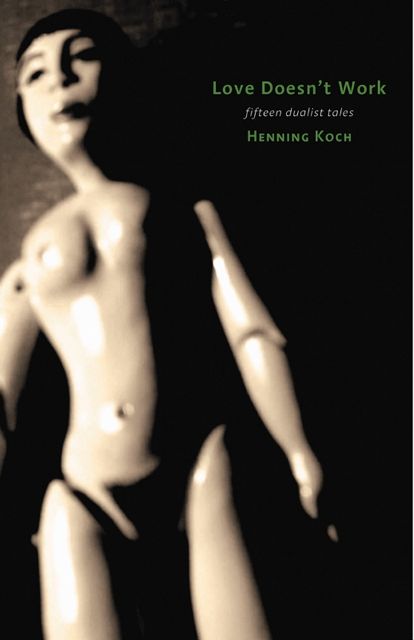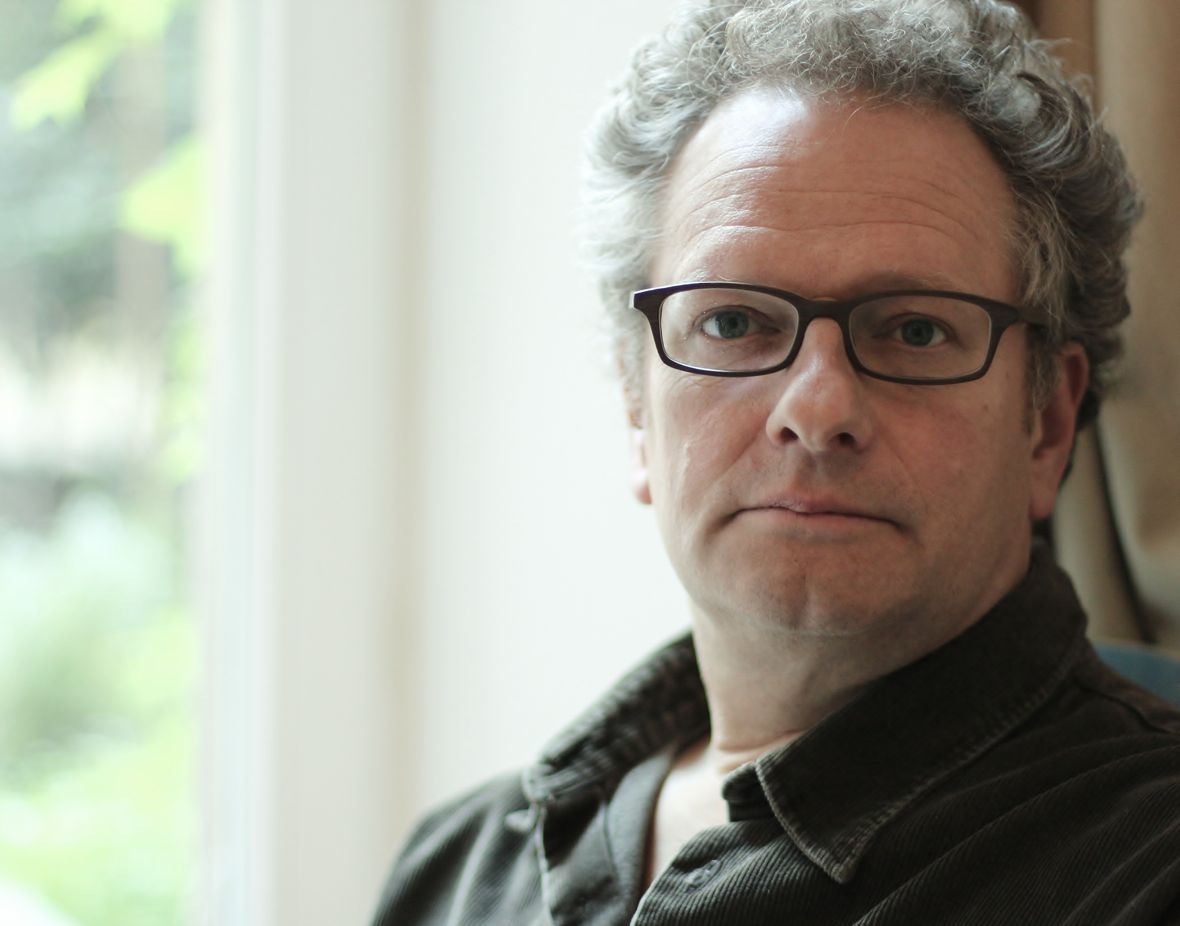Well, I do periodically have pains in my hands and wrists from typing too much.
But this is generally remedied by getting yourself a good chair. It may sound ridiculous, but every few years I buy the best possible orthopaedic chair I can afford, so I can work comfortably.
When you get into your chair it should be like a pilot getting into his cockpit. As you’ll be creating new worlds in this chair, make sure you love easing yourself into it every morning.
I find that general stress is not good and can actually aggravate inflammations. Back pain is easily avoided by stretching daily, even just for ten minutes in the morning, and trying never to sit for more than 30-40 minutes at a time. Getting up and stretching for even a minute, or just briskly walking to the shop for a newspaper, can really help.
Writing, for me, is a pleasure even when I hate it. It doesn’t cause me headaches or any other problems. But if I am doing some commissioned job with a tight deadline I will occasionally curse the computer and wish I could spend my days doing something more constructive. The lesson is, leaving the house for an hour now and then is not going to make you miss the deadline.
Control Your Time and Get Out of Your Routine Now and Then
Writing does have some disadvantages, but one of the main benefits it offers is a measure of control over your own time. So I usually take a long lunch and if possible I have a sleep afterwards. I can comfortably fit in a walk to our son’s nursery to pick him up, and this is also fun. Or I go to bed early and start working before five in the morning, I can compensate with a nap later in the day.
Occasionally it’s good to have a change of scene, go somewhere else for even a few weeks. Writers are free to work anywhere. It doesn’t have to be expensive. You can borrow a house somewhere, get out of the routine, and come back refreshed.
Healthy Snacks and Ginger Tea
Healthy snacks? Hmm… I try to eat nuts or dried fruits rather than potato chips. I like wine a lot, I sometimes drink a couple of glasses or even half a bottle over lunch if we’re having some really good food. This helps me relax and feel all is well with the world.
Life is to be enjoyed, and one of the best kinds of enjoyment is the feeling that one can make the rules oneself—whilst avoiding becoming an alcoholic, of course. Working as an artist, for me, is not about being monastic. At best it’s sybaritic, and the only worthwhile luxury in the long run is not gold, but freedom.
In the evenings if I am working I will often peel a big piece of ginger and make a refreshing, stimulating tea with honey. This is much more effective than coffee if one is looking for a late-night kick.
How Writers Can Avoid Back Problems
My chiropractor showed me four morning stretches and told me that if I faithfully spent five to ten minutes every morning doing them, I would never have to come and see him again. That was about ten years ago, and I have never been back.
One tip I have for writers out there with back problems, is to find a really good chiropractor and ask him/her the same question. (And then, of course, don’t forget the chair!)
Never sit for more than 30-40 minutes, even if you just break for one minute it’ll help you.
Who Are You Thinking About?
Get some air. How are you supposed to have anything interesting to say when you sit there all day like a lump breathing in the dust? Get up, move yourself, move your thoughts, too.
Don’t just think about yourself. You may be a writer, but that does not put you in a different category from anyone else.
Think about others, what they are going through. Think about the world and how it operates. Look at life! That’s your subject!
The Struggle to Get Book Sales
For me the biggest emotional challenge, if I can call it that, has been the difficulty I have had getting attention in the media—reviews, etc.—and as a consequence, failing to sell a reasonable number of books.
I am one of the lucky ones in that I have a thriving side-line as a literary translator, but in the end this is not what I really want to do. Often I end up translating books I dislike, and there is frustration in putting one’s time and, by extension, one’s life, into writing that does not represent what one wants to say.
I should emphasize that I don’t dislike commercial fiction if it is well written and entertaining. But I have spent years working on my own writing, to express ideas that are important to me. In my latest book I tried to produce a witty deconstruction of organized religion and a fresh perspective on Jesus and what he really represents to me. I am not religious, but I am interested in spirituality. It took me years of practical exploration before I was ready to say all that.
Yet maybe it has also been a good lesson?
Creative writers shouldn’t burden themselves with unrealistic expectations. They should rather think of themselves as miners doing a job few others could ever put up with.
Getting up at dawn, putting on dirty clothes and heading down into the icy-cold, dark, inhospitable seams to hack away at black rock for a pittance.
Focus More on the Writing, Less on Oneself
If one wants to enjoy being a writer, it’s much more important to focus on the writing process. It’s a worthwhile thing in itself, it has objective standards. Those who publish in the expectation of gaining plaudits will very likely experience severe disappointment. However good they are—and even if they deserve much better in all sorts of ways—they have to face up to the indifference of the world.
In Brueghel’s “The Fall of Icarus”, Icarus, a sort of representation of the artist, was pleased with his wings, but he ignored the fact that if he flew too high the sun would melt the wax they were attached with.
W.H. Auden commented in a famous poem that Icarus’s fatal crash seems unimportant in the painting. I think artists tend to have an inflated opinion of themselves. I have learned from experience to take myself seriously without at the same time trying to make myself important (actually it wasn’t so difficult—life taught me that lesson pretty fast!).
Many writers end up putting strain on their families because they go through life dissatisfied and full of frustration. This should be avoided (I guess that’s an understatement).
Spend Time with Non-Writers
I think the isolation of writing can be a problem, so writing needs to be combined with plenty of human interaction, not just with family but friends, colleagues, and people wholly outside the loop of writing—I’m talking about spending time with chefs, gardeners, sea captains, beekeepers, receptionists, librarians, publicans, door-to-door salesmen, guitarists, detectives, entrepreneurs… and the unemployed.

Stories come from somewhere. Writers need to realize that there is a whole world out there where writing is not the main area of concern.
Once this has been clearly understood, the writer can write with a clearer mind—that is, a mind free of the awareness that it is writing.
Breadth of vision creates a better writer—a person who is in touch with the bread and the butter of life, the soil and the manure. Not just roast beef; that’s too rich on a daily basis.
I have never really had writer’s block—that must be terrible. If I did, I would deal with it by not writing for a while and spending more time outside, working in a garden, playing with my son, or maybe sailing. Sooner or later the urge or ability to write would come back, I’m sure.
Art is NOT Like Business
The key to a successful artistic life is to enjoy it and find a balance in it. So what (I tell myself) if I don’t sell a hell of a lot of books? Better questions might be: Am I satisfied with my book? Do I think I could have done better?
I tell myself that not being a bestselling writer is not necessarily a mark of my being a bad writer. I have read (and translated) several bestselling books that I would personally say were absolutely dismal.
In other words, anyone who wants to be an artist has to accept that art is not like business. The same rules do not apply. You may feel you have written a good book, but this will not necessarily make you a lot of money.
Writers Need to Decide Where They Belong
Writers need to decide where they belong. Are they creative people looking to maximize their art and craft, or are they business people intent on buying a yacht and living on the Upper East Side of Manhattan?
My compromise is, I can have a small, cheap sailing boat and I can live in a spacious home where property is less expensive than Manhattan. And on top of it all I can have time to sail my twenty foot dinghy whenever I like.
But I am still ambitious to produce good work and I would be a liar if I tried to suggest that I have given up on writing a novel that makes waves. I try to be patient, I accept it may take me three or four novels before I really start hitting my stride.
Dzanc Books were excellent and courageous for giving me a chance in 2011 when I published my short stories, and again in 2014 when my novel was released. I remind myself of that whenever I get despondent. Writers have to count their blessings.
Whatever it takes—whether it’s good friendships, hiking, or hanging out in nightclubs—writers need to focus on the world beyond their personal artistic goals. Artists can get self-centered. The more pressure they apply the less yield they’ll get.
Finally, to answer the original question. I am a bit of a tank. I keep going. And then I keep going some more.
The Darkest Moment: When I Didn’t Feel “Good Enough”
I don’t think in such dramatic terms about my “career.” I actually don’t think of my writing as a career at all. Even if it is. But yes, it was hard while I was still trying to get published.
I kept a huge pile of rejection letters until one day after getting my first publishing contract I decided to burn it. That felt good.
When I look back I realize that I beat myself up a lot in those days about not being “good enough.” Now I don’t think in those terms. I think writing success is so much more about clarity of purpose than presenting some sort of quality standard.
The One Thing That Has Kept You On Your Path
I think of “a path” as something that is behind me, not in front. Otherwise it’s easy getting caught up in notions such as destiny.
A path is something one creates by putting one foot in front of the other. And my only destiny is to do what I end up doing, not to stay on any pre-ordained path that ultimately may prove limiting.
Having said that, I always had a desire to be a writer, and when I was younger this was something that had an almost mystic significance. I tried other jobs and got fired from most of them, not by being totally hopeless but simply by not fully committing.
At various times I was a chef (often fired), a language teacher (fired/resigned), a clerk in a shipping company office (resigned), an Internet site editor (fired). In the end I realized I really did want to write for a living, and doing anything else just wouldn’t work for me.
I also think it’s fine from time to time, if an opportunity presents itself, to “stray” from the “path.” Occasionally I will take on a very commercial writing job. There is nothing wrong with that, as long as one tries to put all of one’s desire and ability into it.
So-called “purists” are often people with a morbid need to take everyone else down a notch. But things are not always so black-or-white. I know a couple of good Swedish novelists who write crime novels under pseudonyms—I assume they do this so they can take their families on holiday now and then, or pay off some heavy bills. Is this wrong? No. Does it debase the craft of writing? No.
In fact what debases the craft of writing has much more to do with the other end of the chain—the agents, the publishers, and the media. There’s a whole plethora of writers out there. Mainstream media has a responsibility to portray the full diversity of literary culture, not just lazily focus on a handful of well-known names.
Advice for a Young Writer: Find Like-Minded People
Try to find like-minded people to spend your time with.
Don’t listen to cynics who ridicule your efforts to set up a backstreet theatre, start a literary journal, or write a novel. Go for it. You are young and you have a few years to find a place where your ambitions and the real world meet.
Later, some of your friends will achieve positions of influence in society—or you will. And, in fact, your friends (some people call them “contacts,” but I try not to) are the most important factor governing success. Young writers need people willing to believe in them. Human nature is what it is, people want to work with a known quantity. However underachieving you are, if you have a friend who’s an editor at a magazine and who knows your capacity and inner quality, you may suddenly find an opportunity presenting itself.
It’s much harder to get into a network once it is already successful. Big directors, admired publishers, are inundated by clever, ambitious people looking for an opening. And chances are they are going to be a lot cleverer than you… also from better schools and with richer daddies (that’s figurative, of course).
Remember, you are new blood and you are fresh.
This gives you a great advantage over the old hands manning the decks. Society has an appetite for new faces. Work on what makes you different, don’t try to be like the others. Find your style and try to recognize the tools you have in your personal tool-box.
Be patient, be persistent. Don’t despair, enjoy your life. Travel, try to broaden yourself and challenge your own preconceptions.
Keep your eyes open for a mentor.
This may not be a person of influence. It may for instance be an old retired schoolteacher you can read poetry with, someone who teaches you all about the Enlightenment or 30’s novelists—someone with passion and insight into your writing, who can help you analyze what you do and how you can improve it.
Don’t chase big names and glamour. Stars have nothing to gain from you, unless they can think of a way of exploiting you. Look for someone you connect with.
Some years back, a great friend of mine, a mentor one might call him, told me: “You can be a writer one day if you’re prepared to starve for it…”
That is something I have always remembered. Especially for younger people starting out, I think it’s a valuable thing to bear in mind. From time to time there may be a need to starve, and fight for one’s goals.
But don’t force it. If you get a great job or an opening of some kind that appeals to you, give it a try. Writing is not going to run away from you. You can always come back to it, and, if you’re really meant to be a writer, you will…
* * *
Henning Koch was born in Sweden in 1962 but has spent most of his life in England, Spain and Sardinia. He is a writer, screenwriter, and literary translator. In 2011, Dzanc published Love Doesn’t Work, a short story collection. The Maggot People is his first published novel. He lives in Berlin with his partner and their two-year-old son.
For more about Henning, please visit his website, or follow him on Twitter or Goodreads.
 The Maggot People: A young man meets a woman and falls in love with her, despite her protestations that he will soon turn into “a maggot person”—a maggot-filled body topped by a still-functioning brain.
The Maggot People: A young man meets a woman and falls in love with her, despite her protestations that he will soon turn into “a maggot person”—a maggot-filled body topped by a still-functioning brain.
Michael begins experiencing severe pains, and the young woman’s prophecy begins to take hold.
Available at Amazon and Dzanc Books.
* * *
 Love Doesn’t Work: Offers classic storytelling with profound, startling insights into human desire and its shortfalls.
Love Doesn’t Work: Offers classic storytelling with profound, startling insights into human desire and its shortfalls.
Inspired by the ancient Cathars, these seven tales present a vision of life as an inevitable struggle against ignorance, darkness and sexual confusion.
Devilish and playful in tone, they leave the reader with a sense of outraged satisfaction and delight.
Available at Amazon and Dzanc Books.



Your approach to writing is refreshing. I will take to heart your advice to get out there and live so I have something to write about. Sometimes I feel guilty about doing that, but it could only make me a better writer!
Hi Chere,
I really do think that’s right. In this article I had the chance to say what I feel is the best way to go about things. Of course, like anyone else I have mornings when I sit there glumly staring into my cup of tea. But frankly it’s worth remembering that right now, somewhere, there’s a mountain with snow blowing off it, or some other amazing thing that I would like to see, and I think it’s better to get up and go have a look.
Anyway, wishing you all best, Henning
Thank you, Colleen, and thank you, Henning. No longer an aspiring young writer myself (not even sure I am aspiring from a publication standpoint; the blog may be enough) but I found much of the advice useful, and just something about your tone and the approach to your work resonated in a way that was fresh and honest and reassuring.
Thank you, Paula. I felt the same about Henning’s words. A lot of great thoughts here. Thanks for stopping by. :O)
Thanks, Paula. I think we writers have a tendency to beat ourselves up, which is partly a byproduct of our introspection. And temperament. So I guess it’s a good idea not to follow in the footsteps of all those who ended up on their knees.